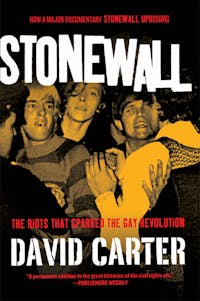Stonewall
The Riots That Sparked the Gay Revolution
 Download image
Download image
ISBN10: 0312671938
ISBN13: 9780312671938
Trade Paperback
360 Pages
$18.99
CA$24.99
A Randy Shilts / Publishing Triangle Award Finalist
In 1969, a series of riots over police action against The Stonewall Inn, a gay bar in New York City's Greenwich Village, forever changed the standing of homosexuals in American society. Since then, the rebellion itself has become the stuff of legend, with relatively little concrete information available on the riots themselves.
But with this important, long-overdue new study—based on hundreds of interviews, exhaustive investigations into public and previously sealed files, and over a decade of intensive research into both the event itself and those it set in motion—Carter brings this singular moment to life in a detailed and definitive account of one of modern history's key social actions.
Stonewall gives us, at long last, the where and why and how of the beginning of the Gay Rights movement.
Reviews
Praise for Stonewall
"Riveting . . . not only the definitive examination of the riots but an absorbing history of pre-Stonewall America, and how the oppression and pent-up rage of those years finally ignited on a hot New York night."—The Boston Globe
"A terrific piece of nonfiction, a satisfying and illuminating document that will be referred to time and again."—The Advocate
"No matter what you may believe about the event, you will gain new insights. Historically important and socially significant."—The Dallas Morning News
"A gripping, hour-by-hour reconstruction . . . this definitive account is long overdue but well worth the wait."—Richard Labonte, Book Marks
"Stonewall presents a thorough, often compelling reconstruction of the nearly weeklong protest . . . provides thoughtful and sometimes delightfully quirky details about the era's gay culture and politics, Greenwich Village itself, and the New Yorkers—from mobsters to flame queens to cops—who that morning stumbled into history."—Providence Journal-Bulletin
"Carter's vividly detailed report and prodigious research bring to life again this major, dramatic event in modern gay history. This was a riot heard round the world, and Carter has done it proud."—Jonathan Ned Katz, author of Love Stories: Sex Between Men Before Homosexuality
"A beautifully written, suspenseful narrative that also meets the toughest tests of academic research."—The Bay Area Reporter
"Considering all that went before, the ongoing repression and corruption, and the scent of social and political liberation in the air, Carter's eloquent account makes it clear that something was bound to catch fire . . . A complete, full-bodied portrait, with lots of flesh on the bones of a strong narrative structure."—Kirkus Reviews
"David Carter's Stonewall: The Riots that Sparked the Gay Revolution offers readers a sobering reminder of the Stonewall riots and how three days forever changed the gay movement. His comprehensive historical analysis of the Stonewall Inn bar's ties to the Mafia, its diverse clientele and to the birth of the LGBTQ movement is a must-read for anyone studying LGBTQ history. Carter exhaustively examines how the Stonewall Inn became a symbol of a new era of LGBTQ politics. The book is reminiscent of Michelangelo Signorile's Queer in America, marking a period when the LGBTQ political paradigm forever changed. Carter, a freelance writer hailing from New York's Greenwich Village, offers a large number of personal accounts of the riots, riots that transformed the gay and lesbian movement from an early 1960s era of assimilation to a new form of radicalism. Also, his book dispels the popular myth that Greenwich Village drag queens, exhausted from continual police harassment, finally fought back and began to riot because they were mourning the loss of Judy Garland. In fact, Carter does an excellent job of showing how several groups—not just drag queens, but lesbians, street people and hustlers—responded to police raiding the Mafia-owned bar. Surprisingly, the police initially received support from Stonewall patrons, who were tired of the Mafia running local gay and lesbian bars. But as the police became forceful in their arrest of an unknown combative lesbian who questioned, 'Why don't you guys do something?,' the Village spectators' jeers and camp calls evolved into the throwing of coins, paving stones, parking meters and finally erupted into the historic three-day riot. In part one, 'Setting the Stage,' Carter describes the Stonewall Inn by beginning with its birth in the 1930s, when two Greenwich Village businesses—a stable and a bakery—were formed into one building at the ground floor level on Christopher Street. He examines early Greenwich Village history, from its Dutch farmland background to popular beatnik hangout of poets. Carter tells the anguished stories of individuals forced to hide in an era in which homosexuality was a shameful, dirty secret. In part two, he traces the evolution of the riots by detailing the bar's notorious Mafia ownership and streetwise clientele; he uses personal accounts that place the reader inside the bar the first night of rioting. Finally, in part three, Clark illustrates the birth of the Gay Liberation Movement, and chronicles the Greek lambda symbol of gay power. Overall, Carter shows how the Greenwich Village's Stonewall Inn rebellion incited a new wave of militant groups willing to take immediate, direct action against the establishment of anti-homosexual organizations. His account shows how LGBTQ liberationists made police aggravation the exception rather then the rule in New York City. Often we take for granted that our brothers and sisters fought long and hard for the LGBTQ community to have visibility. Carter's historical account of the Stonewall Inn's real contribution reminds us where we've come from."—Ken Cimino, adjunct professor, California State University at Los Angeles


